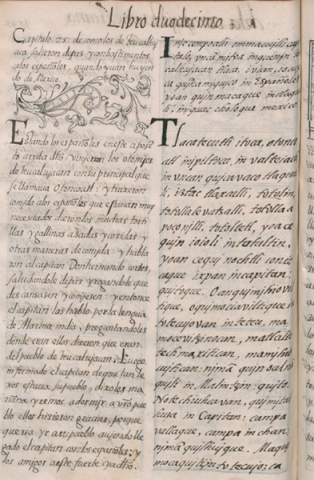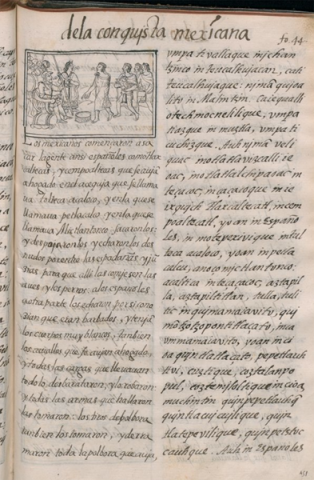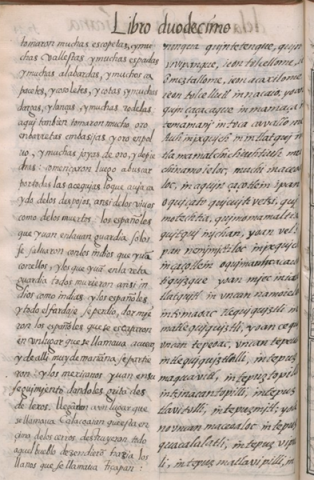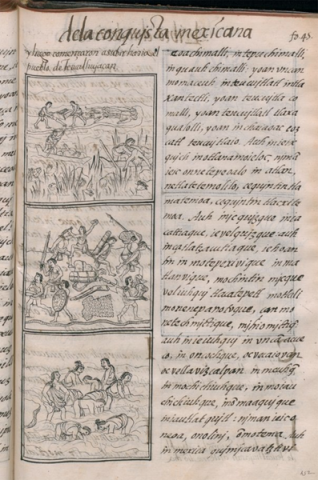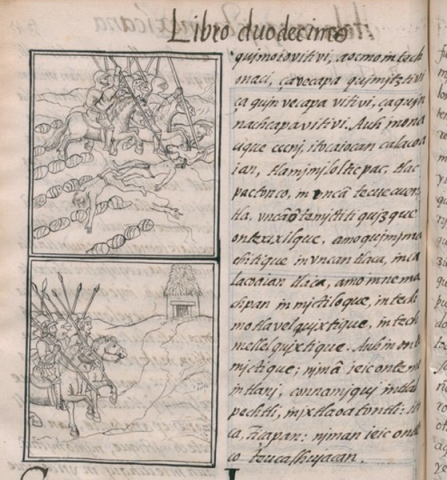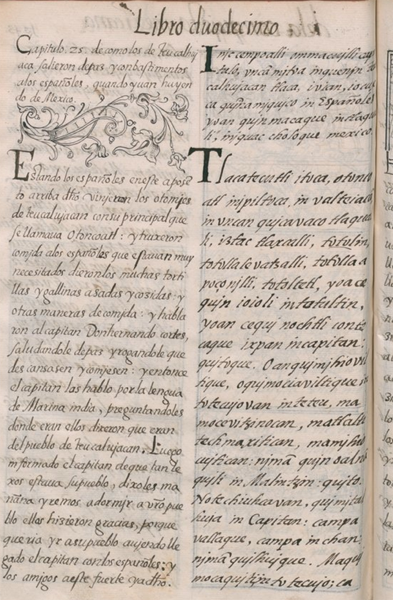 |
[Transcription of the Nahuatl (right-hand column) by James Lockhart:]
[f. 43v.] Inic cempoalli ommacuilli capitulo, vncā mitoa in quenin Teucalhuiacan tlaca, ivian, iocuxca quīnamiquico in Españoles yoan quinmacaque in tlaqualli, iniquac choloque mexico.
Tlacatecutli itoca, otoncoatl in ipiltoca, in valteiacā, in vncan quicavaco tlaqualli, iztac tlaxcalli, totolin, totollalevatzalli,* totollaapoçonilli, totoltetl, yoa cequinioioli in tutultin, yoan cequi nochtli contecaque ixpan incapitan: quitoque. Oanquimihioviltique, oquimociaviltique in totecuiovan in teteu, ma mocevitzinocan, matlaltitech maxitican, ma mihiocuitican:
nimā quinoalnāquili in Malintzin: quito. Notechiuhcavan, quimitalhuia in Capitan: campa vallaque, campainchan: nimā quilhuique. Ma quimocaquiti in totecuio; ca
----------
*TOTOLLALEVATZALLI. See fol. 27r.
|
[Translation of the Nahuatl (right-hand column) by James Lockhart:]
Twenty-fifth chapter where it is said how the people of Teocalhueyacan came in peace to meet the Spaniards, when they fled from Mexico, and gave them food.
Tlacateuctli was the [official] name and Otoncoatl the personal name of the leader of those who came there to deliver food. They laid down before the Captain white tortillas, turkey hens, roast turkey, boiled turkey, eggs, and some live turkey hens, as well as some tuna cactus fruit. They said, “You are doubly welcome; may our lords the gods rest, may they lie down and catch their breath.”
Then Marina answered them, saying, “My good men, the Captain says, ‘Where have they come from, where is their home?’” Then they said to her, “May our lord hear:
[Translation of the Spanish (left-hand column) by James Lockhart:]
Chapter Twenty-five, of how the people of Teocalhueyacan came out peacefully and with provisions for the Spaniards when they went fleeing from Mexico.
With the Spaniards lodged as said above, the Otomis of Teocalhueyacan came with their leader, named Otoncoatl, bringing food to the Spaniards, who were in great need. They gave them many tortillas, roasted and stewed fowl, and other kinds of food, and they spoke to Captain don Hernando Cortés, greeting him peacefully and asking that they should rest and eat.
Then the Captain spoke to them with the Indian woman Marina as interpreter, asking them where they were from. They said that they were from the settlement of Teocalhueyacan. Then when the Captain was informed how far their setdement was, he told them, "tomorrow we will go to sleep the night at your setdement." They expressed their thanks because he wished to go to their settlement.
After the Captain with the Spaniards and the friends had reached this fort that was mentioned,
|
[Translation of the Nahuatl into Spanish by Fr. Bernardino de Sahagún; transcription of the Spanish (left-hand column) by James Lockhart:]
[f. 43v.] Capitulo .25. de como los de Teucalhuiaca salieron de paz y con bastimentos a los españoles, quando yuan huyendo de Mexico.
Estando los españoles en este aposēto arriba đħo vinieron los otomies de teucalhuiacan con su principal que se llamaua Otoncoatl: y truxeron comida a los españoles que estauan muy necesitados dieronlos muchas tortillas y gallinas asadas y cozidas: y otras maneras de comida: y hablaron al capitan Don hernando cortes, saludandole de paz y rogandole que descansasen y comiesen:
y entonce el capitan los hablo por la lengua de Marina india, preguntandoles donde* eran ellos dixeron que eran del pueblo de Teucaluiacan. Luego informado el capitan de que tan lexos estaua su pueblo, dixoles man̄ana yremos a dormir a v̄r̄o pueblo ellos hizieron gracias, porque queria yr a su pueblo
auiendo llegado el capitan con los españoles: y los amigos a este fuerte ya đħo.
----------
*DONDE. Normal grammar would demand "de donde."
|
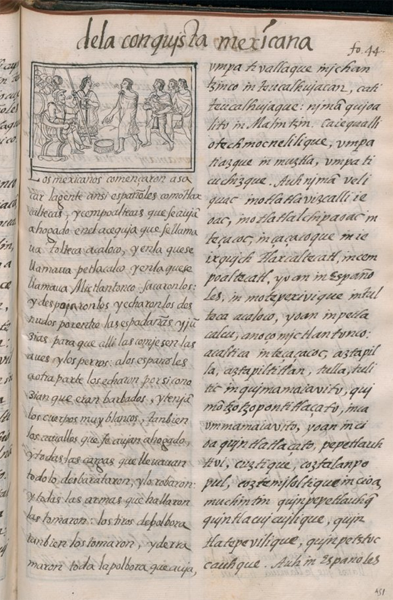 |
[Transcription of the Nahuatl (right-hand column) by James Lockhart:]
[f. 44r.] vmpa tivallaque in ichantzinco in Teucalhuiacan, ca titeucalhuiaque: nimā quioalito in Malintzin. Caie qualli otechmocnelilique, vmpa tiazque in muztla, vmpa ticuchizque.
Auh nimā vel iquac in o tlatlavizcalli ieoac, in otlatlalchipaoac in teçacoc, in çaçacoque in ie ixquichTlaxcaltecatl, in cempoaltecatl, yoan in Españoles, inmotepexivique in tultecaacaloco, yoan in petlacalcu,anoço mictlantonco: acaltica in teçaçacoc, aztapilla, aztapiltitlan, tulla, tulitic in quimamaiavito, quimōtzotzopontitlaçato, inca vmmamaiavito, yoan in cioa quintlatlaçato, pepetlauhtivi, cuztique, coztalanpopul, coztemiloltique* in cioa, muchintin quinpepetlauhq¯ quintlacuicuilique, quintlatepevilique, quinpetztoccauhque. Auh in Espanoles
----------
*COZTALANPOPUL, COZTEMILOLTIQUE. Sahagún 1950-1982: 13.71 has "anointed yellow, painted yellow." The words are obscure to me.
|
[Translation of the Nahuatl (right-hand column) by James Lockhart:]
We have come from Teocalhueyacan,which is his home; we are people of Teocalhueyacan.”Then Marina replied, “Very well, and many thanks. We will go there tomorrow and stay the night.”
And then just as dawn broke and daylight came, [bodies] were removed. They removed all the Tlaxcalans, Cempoalans, and Spaniards who had fallen into the Tolteca canal and at Petlacalco or Mictlantonco. They were removed in boats. They went and flung them out in the stands of white rushes, among the white rushes, in the stands of reeds, in the midst of the reeds, forking them with spears, flinging them away. They also threw down the women, naked, yellow, [yellow all over?]; they stripped all the women, took everything from them, spilled out what they had, left them lying bare. But the Spaniards
[Translation of the Spanish (left-hand column) by James Lockhart:]
the Mexica began to remove the people, Spaniards as well as Tlaxcalans and Cempohualans, who had drowned in the canal named Toltecaacaloco and in the one named Petlacalco and in the one named Mictlantonco. They took them out, stripped them, and threw them naked among the reeds and rushes so that the birds and dogs would eat them, there. They threw the Spaniards in another place, separately. They recognized that they were bearded and had very white bodies.
They also dispersed and stole [what was on] the horses that had drowned and all the loads they carried; they took all the weapons they found; they also took the firearms they found and spilled out all the powder there was.
|
[Translation of the Nahuatl into Spanish by Fr. Bernardino de Sahagún; transcription of the Spanish (left-hand column) by James Lockhart:]
[f. 44r.; un dibujo, y luego:] Los mexicanos començaron a sacar le gente ansi españoles como Tlaxcaltecas, y cempoaltecas que se aviā ahogado en el acequia que se llamaua petlacalco y en la que se llamaua Mictlantonco sacaronlos: y despojaronlos y echaronlos desnudos por entre las espadañas jūzias para que alli las* comiesen las aues y los perros: a los españoles a otra parte los echaron por si conozian que eran barbados, y teniā los cuerpos muy blancos,
tanbien los cauallos que se auian ahogado, y todas las cargas que lleuauan todo lo desbarataron, y lo robaron: y todas las armas que hallaron las tomaron: los tiros de polbora tanbien los tomaron: y derramaron toda la polbora que auia,
----------
*LAS. For "los."
|
 |
[Transcription of the Nahuatl (right-hand column) by James Lockhart:]
[f. 44v.] nonqua quintetenque, quinvivipanque, ie on tolcellome, ie ō meztallome, ie on acaxilome ie on tolcellutl innacaio, yoan quinçaçacaque in mamaçain temamani intoca cavallome.
Auh in ixquich in intlatqui in tlamamalchichiuhtiuhmuchi namoieloc, muchi maceoaloc, in aquin çaço tlein ipan oquiçato quicuitivetzi, quimotechtia, quimomamaltia quitqui in ichan, yoan vel ipan nemimictiloc inixquich in çaço tlein oquimauhcacauhtiquizque yoan miec in iautlatquitl in vncan namoieloc in tomaoac tlequiquiztli in matlequiquiztli, yoan cequi vncan tepeoa, vncan tepeuh in tlequiquiztlalli, in tepuzmaquavitl, intepuztopilli in tzinacantopilli, in tepuztlavitolli, in tepuzmitl: yoā no vncan maceoaloc in tepuzquacalalatli, in tepuzvipilli, in tepuzmatlavipilli, in
|
[Translation of the Nahuatl (right-hand column) by James Lockhart:]
they laid out in a separate place, arranging them in rows. They were [like] tender reed sprouts, new maguey sprouts; their bodies were [like] sprouting reeds and rushes. They also removed the people-bearing deer named horses.
And the goods which they had gone carrying with them were all picked up and acquired by others. Anyone who came upon anything whatever rushed to take and appropriate it, loading it on his back and taking it home, and there was great fighting over whatever they had gone leaving behind in fear, and much war gear was taken: cannon, harquebuses, and some of it lying strewn about—gunpowder, swords, iron lances, halberds, crossbows, crossbow bolts. And also they acquired there iron helmets, iron cuirasses, coats of mail,
[Translation of the Spanish (left-hand column) by James Lockhart:]
They took many muskets, crossbows, swords, halberds, helmets, corselets, coats of mail, long shields, lances, and round shields. Here they also took much gold in small bars, in vessels, and in gold dust, and much jewelry of gold and fine stones.
Then they began to search through all the canals for what spoils had fallen in, from the living as well as from the dead.
Only the Spaniards who went in the vanguard saved themselves, along with the Indians who went with them; everyone in the rear guard died, Indian women as well as men and the Spaniards, and all the baggage was lost.
The Spaniards who escaped slept the night in a place named Acueco, and they left there very early in the morning. The Mexica went pursuing them, shouting at them from afar. Reaching a place named Calacoyan, which is on top of the hills, they destroyed that whole settlement. They went down toward the plains [to a place] named Tiçaapan,
|
[Translation of the Nahuatl into Spanish by Fr. Bernardino de Sahagún; transcription of the Spanish (left-hand column) by James Lockhart:]
[f. 44v.] tomaron muchas escopetas, y muchas vallestas y muchas espadas y muchas alabardas, y muchos capacetes, y cosoletes, y cotas, y muchas dargas,* y lanças, y muchas rodelas: aqui tanbien tomaron mucho oro en barretas em basijas y oro en poluo, y muchas joyas de oro, y de piedras:
començaron luego a buscar por todas las acequias lo que auia caydo de los despojos, ansi de los viuos como de los muertos:
los españoles que yuan en la uanguardia solo se saluaron con los indios que yuā con ellos, y los que yuā en la retaguardia todos murieron ansi indios como indias y los españolaes y todo el fardaje se perdio,
dormieron los españoles que se escaparon en vn lugar que se llamaua acueco, y de alli muy de mañana se partieron: y los mexicanos yuan en su seguimiento dandoles grita desde lexos. llegādo a vn lugar que se llamaua Calacoaian que esta ençima de los cerros destruyeron todo aquel bueblo dezendierō hazia los llanos que se llamaua Tiçapan:
----------
*DARGAS. For "adargas."
|
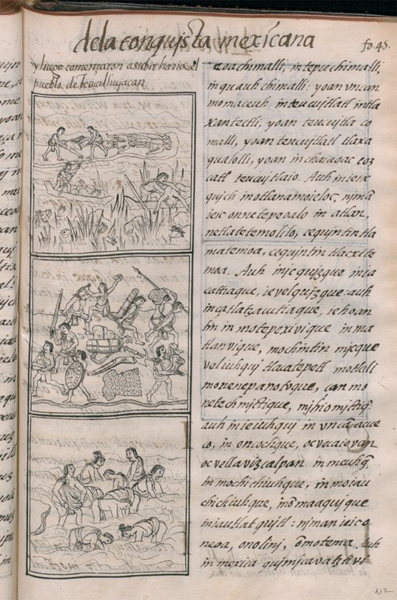 |
[Transcription of the Nahuatl (right-hand column) by James Lockhart:]
[f. 45r.] eoachimalli, in tepuchimalli, in quauhchimalli: yoan vncanmomaceuh in teucuitlatl in tlaxantectli, yoan teucuitlacomalli, yoan teucuitlatl tlaxaqualolli, yoan in chaiaoaccozcatl teucuitlaio.
Auh in ie ixquich in otlanamoieloc, nimā ie ic onne tepeoalo in atlan, netlatetemolilo, cequintin tlamatemoa, cequintin tlacxitemoa.
Auh inic quizque in iacattiaque, ie vel quizque: auhin ça tlatzacutiaque, iehoantin in motepexivique in matlanvique, mochintin micque vel iuhqui tlacatepetl motlali monenepanotoque, çan monetechmictique, mihiomictiq̄:
auh in ie iuhqui in vncā acueco, in oncochque, ocveca iovan oc vellavizcalpan in meuhq̄, in mochichiuhque, in moiauchichiuhque, in ōmaaquique in iautlatquitl: niman ie ic oneoa, onolini, ōmotema. Auh in mexica quimicavatztivi
|
[Translation of the Nahuatl (right-hand column) by James Lockhart:]
leather shields, metal shields, wooden shields. And they acquired there gold in bricks, golden disks, and gold dust, and gilded necklaces with pendants.
And when they were through taking things, everyone scattered in the water, searching; some searched with their hands, some with their feet.
When they [the Spaniards] were coming out, those who went in the lead were able to get through, but those who came behind were the ones who fell in, who fell in the water. They all died. It was truly like a mountain of people that was formed. They lay pressed against each other, killing and smothering each other.
While this went on, [the Spaniards] at Acueco kept sleeping. It was still very dark, still dawn when they arose and readied themselves, dressing for war, donning their war gear. Then they made their departure, got started on their way, put themselves in order. And the Mexica went clamoring at them,
[Translation of the Spanish (left-hand column) by James Lockhart:]
and then they began to climb toward the settlement of Teocalhueyacan.
|
[Translation of the Nahuatl into Spanish by Fr. Bernardino de Sahagún; transcription of the Spanish (left-hand column) by James Lockhart:]
[f. 45r.] y luego començaron a subir hazia el pueblo de Teucalhuiacan.
[Aquí: tres dibujos]
|
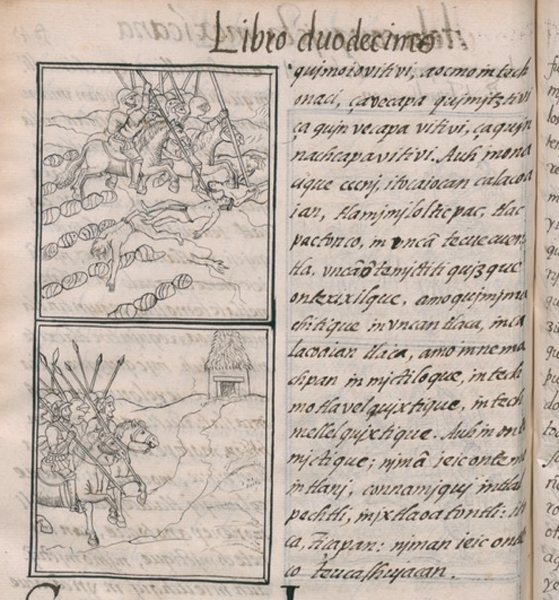 |
[Transcription of the Nahuatl (right-hand column) by James Lockhart:]
[f. 45v.] quimoiovitivi, aocmo intech onaci, ça vecapa quimitztivi ça quinvecapavitivi, çaquinnachcapavitivi. Auh in onacique cecni, itocaiocancalacoaian, tlamimilolticpac, tlacpactonco, in vncā tecuecuentla, vncā ōtemictitiquizque ontexixilque, amo quimimachitique in vncan tlaca, in calacoaian tlaca, amoinnemachpan in mictiloque, intech motlavelquixtique, intech mellelquixtique. Auh in ontemictique: nimā ie ic ontemo in tlani, connamiqui in tlalpechtli, in ixtlaoatontli: itoca, Tiçapan: niman ie ic ontleco Teucalhuiacan.
|
[Translation of the Nahuatl (right-hand column) by James Lockhart:]
yelling at them; they no longer caught up to them, but went looking toward them from afar, dealing with them from afar, from a good distance. And when the Spaniards reached a certain place called Calacoyan, on top of a rounded hill, up on the little eminence, where there were rows of rocks, they started killing and stabbing people. They did not give notice to the people there, the people of Calacoyan; unexpectedly they were killed. [The Spaniards] took out their rage on them, vented their wrath on them. When they had done the killing, they went down below, encountering some flat land, a little plain called Tiçaapan; then they went up to Teocalhueyacan.
[Translation of the Spanish (left-hand column) by James Lockhart:]
(intentionally blank)
|
[Translation of the Nahuatl into Spanish by Fr. Bernardino de Sahagún; transcription of the Spanish (left-hand column) by James Lockhart:]
[f. 45v., la parte de arriba, dos dibujos; sin texto en español]
|
